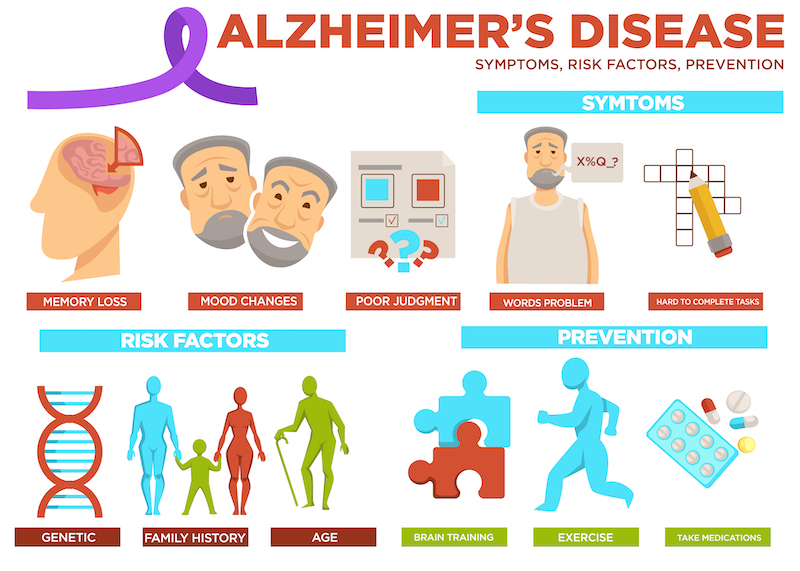
By Dr. Brandon Colby MD, a Personalized Preventive Medicine specialist and expert in clinical genomics.
Alzheimer’s disease is the most common type of dementia, which is characterized by progressive cognitive decline and memory loss. It has been estimated to affect nearly 44 million people around the world.1
As our life expectancy continues to increase, and previous generations enter their senior years, it’s no surprise that the incidence of neurodegenerative diseases is also increasing.
Alzheimer’s disease is a scary prospect for most of us, and it’s a disease that places a heavy burden on patients, their loved ones, and their caregivers. But over the years, we have come to learn a lot more about how Alzheimer’s, why it occurs, and what we can do to fight back against this disease.
Thankfully, we now understand that Alzheimer’s disease doesn’t have to be part of a normal aging process and that there are many lifestyle choices that can be helpful to slow down the onset of Alzheimer’s disease by many years or even prevent it.
Let’s learn more about the risk factors of Alzheimer’s disease and what you can do to protect yourself against this condition.
Risk Factors of Alzheimer's Disease

There are several risk factors that can increase your likelihood of developing Alzheimer’s disease at some point in your life. Some of these risk factors can’t be modified, but fortunately, there are things you can do to lessen the impact of other risk factors.
Risk Factor #1: Genetics
Although Alzheimer’s isn’t a strictly genetic disease, your genetic information does play an important role in determining your risk of developing this condition.
The APOE gene regulates several processes that help maintain your brain health and cognitive function, and it codes a protein called apolipoprotein E. This protein helps break down deposits of a substance called beta-amyloid, which forms amyloid plaques and tangles in the brain.2
The APOE gene has different alleles that we can inherit from our parents. Each allele impacts our risk of developing Alzheimer’s differently:
- APOE2: this is the least common variant of the APOE gene, and it has been found to protect against Alzheimer’s disease by increasing the production of apolipoprotein E.
- APOE3: up until recently, it was thought that the APOE3 allele didn’t impact our risk of Alzheimer’s either way. But new studies suggest that, in combination with other genetic mutations, it can also increase our risk of Alzheimer’s.
- APOE4: this allele acts as a genetic risk factor for Alzheimer’s, since it leads to a decreased production of apolipoprotein E, thus affecting our brain’s ability to clear up beta-amyloid. Having even a single copy of this gene increases your risk of developing the disease.
Other genes have been found to play a role in Alzheimer’s disease, including:
- TOMM40 gene
- GAB2 gene
- TREM2 gene
- SORL1 gene
- CLU gene
- CR1 gene
- ABCA7 gene
- PICALM gene
- PLD3 gene
Early-onset familial Alzheimer’s disease (eFAD), is far more related to your genes. eFAD is a genetic disease with an autosomal dominant inheritance pattern, which means that inheriting a gene for this disease from just one of your parents will result in developing eFAD. The genes that are associated with this form of Alzheimer’s are:
- Amyloid precursor protein (APP) on chromosome 21
- Presenilin 1 (PS1) on chromosome 14
- Presenilin 2 (PS2) on chromosome 1
Risk Factor #2: Age
Age is, unfortunately, another genetic risk factor that we simply can’t modify — although many of us wish we could!
Although we now know that Alzheimer’s and other types of dementia aren’t a normal part of healthy aging, our risk of cognitive decline undoubtedly increases as we get older. Most cases of Alzheimer’s disease begin after the age of 65 years old, which is also known as late-onset Alzheimer’s disease.
Approximately 10 percent of all cases affect people under the age of 65 as early-onset Alzheimer’s disease3, which progresses very similarly to late-onset Alzheimer’s. Only 0.1 percent of all cases are caused by early-onset familial Alzheimer’s disease.
Risk Factor #3: Mild cognitive impairment (MCI)
Mild cognitive impairment (MCI) is a condition that causes cognitive decline that is more severe than what is normally expected according to someone’s age.
Not everyone who has MCI goes on to develop Alzheimer’s disease.4 However, it’s considered to be a risk factor for Alzheimer’s, and approximately 40 percent of seniors diagnosed with MCI go on to develop some type of dementia within the next three years.
Risk Factor #4: Cardiovascular Disease
Your cardiovascular health and brain health are inextricably linked in many different ways, and this includes your risk of Alzheimer’s. Heart disease has been found to increase the risk of developing Alzheimer’s disease and vascular dementia. There are many different types of diseases that can affect your cardiovascular system, including:
- Atherosclerosis
- Hypertension or high blood pressure
- Stroke
- Coronary heart disease
Risk Factor #5: Traumatic Brain Injury (TBI)

Observational studies have found a strong link between traumatic brain injury, and the development or advancement of Alzheimer’s disease and other types of dementia.5 The more severe the TBI, the greater the increased risk for Alzheimer’s.
Risk Factor #6: Substance Abuse
Consuming large amounts of alcohol and smoking tobacco increase a person’s risk of developing Alzheimer’s disease and mental decline. These behaviors can also increase your risk of heart disease.
However, the same can’t be said for having the occasional glass of wine. Studies have found that moderate alcohol consumption — specifically, red wine, which has an abundance of health-protective phenols, — may protect your heart and, at the same time, decrease your risk of dementia.6
Risk Factor #7: Down Syndrome
Down syndrome occurs when someone has an extra copy of chromosome 21, which is why the condition is also called trisomy 21.
Chromosome 21 also contains the APP gene, which is linked to early-onset familial Alzheimer’s disease — as a result of having an extra copy of this gene, most individuals with Down syndrome also develop symptoms of Alzheimer’s disease by the time they’re 40 years old.
Other risk factors:
There are other risk factors that could influence your likelihood of developing Alzheimer’s disease to a lesser degree. Other risk factors are still being researched in order to better understand the mechanisms through which they increase the risk of dementia and Alzheimer’s. Additional risk factors for Alzheimer’s disease include:
- Diabetes
- Social isolation
- Low education levels
- Untreated depression
- Dyslipidemia (high cholesterol/triglycerides)
- High serum levels of homocysteine
Ways to Prevent Alzheimer's

Now that we know the factors that can increase your likelihood of developing Alzheimer’s, it’s also important to discuss what you can do to prevent Alzheimer’s disease.
Medications to Prevent Alzheimer's
Despite the fact that there’s no cure for Alzheimer’s disease, certain medications can be used to manage and prevent the advancement of its symptoms.7 Meanwhile, research has found that other medications can even confer some protection against Alzheimer’s.
Medication #1: Non-steroidal anti-inflammatory drugs (NSAIDs)
Research suggests that long-term, daily use NSAIDs, such as ibuprofen, can provide some protection against Alzheimer’s disease. The reason for this isn’t completely understood yet, but researchers have theorized that it’s due to the anti-inflammatory properties of these drugs.
However, you should also keep in mind that regular NSAID use can also lead to certain complications, such as stomach ulcers and blood clotting abnormalities. Therefore, it’s important to ask your doctor for guidance before starting any medical treatments.
Medication #2: Statins
Statins are commonly used to treat high cholesterol levels, but studies have found that they could also inhibit the formation of the brain plaques and tangles that lead to Alzheimer’s.9 Statins are widely used around the world, and many people take them starting in their midlife or even earlier.
These medications include:
- Simvastatin
- Lovastatin
- Pravastatin
Natural Ways to Prevent Alzheimer's
Lifestyle changes and wellness strategies can help lower your risk of dementia and Alzheimer’s disease.
Build a Cognitive Reserve
A cognitive reserve is exactly what it sounds like: a reserve of brain cells and increased neuroplasticity meant to offset the damages caused by age and neurodegenerative disorders.10
Since we’re all going to get old — or at least, we expect that we will be able to do so —, we should all do our best to build a cognitive reserve. However, mental stimulation strategies are even more beneficial for people who have a family history or genetic risk for Alzheimer’s disease and other types of dementia.
Activities that can help you build a cognitive reserve include:
- Continuing your education
- Working complex jobs
- Challenging mental activities
- Taking part in hobbies
- Learning new skills
- Engaging in social interaction
- Using your non-dominant hand
- Playing a musical instrument
Brain Games
Brain games are another strategy to increase your cognitive reserve. Again, anyone can benefit from brain games, such as:
- Lectures
- Sudoku
- Chess
- Card games
- Crosswords
- Video games
- Memory games
Stay Healthy and Active

Leading a healthy lifestyle can help minimize several risk factors for Alzheimer’s disease and other types of dementia.
- Get regular aerobic exercise
- Maintain a healthy weight
- Follow a healthy diet
There are multiple reasons why maintaining your overall health can help prevent Alzheimer’s. Staying at a healthy weight and preventing obesity can help prevent heart disease, while physical activity can also improve your cognition and brain plasticity. Dietary approaches can also help stop hypertension. A sedentary lifestyle, on the other hand, significantly increases your risk of developing Alzheimer’s disease.
Alzheimer's Prevention Diet

When it comes to food, many doctors believe that the Mediterranean diet is the way to go for Alzheimer’s prevention. Research suggests that this delicious diet can help slow the changes in your brain function that occur during early Alzheimer’s disease.11
This healthy eating diet has also been shown to be beneficial for your cardiovascular health, which supports the saying 'what's good for the heart is good for the brain.'
The Mediterranean diet is a plant-heavy diet that's high in antioxidants and includes:
- Fruits
- Vegetables
- Whole grains
- Olive oil
- Fatty fish
- Moderate amounts of poultry, beans, dairy, and eggs
- Moderate amounts of red wine
- Limited amounts of red meat
Additionally, regular coffee consumption has also been found to protect your brain against Alzheimer’s.
Learning a New Language
Learning a new language is another way to improve your cognitive research, increase neuroplasticity, and challenge your brain.
Studies have found that bilingual people with genetic risk factors for Alzheimer’s exhibit symptoms later on in life when compared to people who only speak one language.
Prevent Head Trauma
As we discussed above, traumatic brain injuries can significantly increase your risk of developing Alzheimer’s disease. It may not be possible to prevent every instance of head trauma — after all, accidents always happen — but there are steps you can take to make TBI less likely, including:12
- Wear a helmet during contact sports or while riding bikes, motorcycles, etcetera
- Create a safe environment to prevent falls for seniors and children
- Never drive under the influence of alcohol and/or drugs (even prescription drugs)
- Don’t text and drive
- Always wear a seatbelt
Supplements

Vitamin E was long believed to prevent or relieve many diseases; however, clinical trials have found that excessive consumption of this vitamin can actually lead to poor outcomes and even death.
Rather than regularly taking high-dose supplements of this vitamin, it may be a better idea to ensure that you consume enough vitamin E in your diet — unless your doctor prescribes it due to a deficiency.
Omega-3 fatty acids, which include DHA and EPA, are commonly found in fatty fish. These fatty acids have been found to have significant health benefits, such as lowering cholesterol levels, reducing inflammation, and preventing heart disease.
Low levels of omega-3 fatty acids have been linked to an increased risk of Alzheimer’s; this imbalance can be corrected through supplements. However, that doesn’t mean that everyone should start taking fish oil immediately.
Omega-3 Fish Oil May INCREASE Your Risk Of Alzheimer's Disease
Several research studies have found that omega-3 fatty acids, such as those found in fish oil supplements, increase the risk of Alzheimer's in people who have a specific version of the APOE gene known as the APOE4 allele.13
The researcher discovered that for people with APOE4, instead of having a beneficial effect, omega-3 fatty acids combined with APOE4 cause more oxidative damage to the brain!
This occurs because the APOE gene is involved in processing omega-3 fatty acids and the APOE4 variation is thought to radically change how the body processes omega-3s. While APOE4 causes damage to the brain even without omega-3s, consuming extra omega-3s appears similar to throwing gasoline upon a fine.
Instead of the omega-3s being helpful in preventing dementia, for people with APOE4, omega-3s appear to be harmful and may actually increase Alzheimer's risk.
This is one of the reasons why it's important to know whether you have APOE4 before taking supplements that contain omega-3s.
Genetic Testing for Alzheimer's

Genetic testing for Alzheimer's can identify whether a person has any genetic variants that increase their risk of Alzheimer’s disease. Sequencing technologies, such as whole genome sequencing, have made it possible to identify variants in any part of our genome, and they can determine your genetic risk for this disease.
Discovering whether you have a genetic risk factor for Alzheimer’s — such as the APOE4 allele — may sound scary, but it can also help you take the necessary steps to prevent this disease from an early age. With appropriate management, many people are able to prevent or slow the onset of Alzheimer’s disease and other health conditions.
Sequencing.com offers the Ultimate Genome Sequencing test, which uses WGS to identify variants that affect any base pair in your genome — and as a result, you’ll get access to an incredible amount of information regarding your health, genetic risks, wellness, ancestry, and much more.
Our tests are able to determine your risk of Alzheimer’s disease, and they will enable you to make the best decisions for your health moving forward.
Visit our Education Center to learn more about WGS, genomics, and how genetic testing can help you stay healthy.
About The Author
Dr. Brandon Colby MD is a US physician specializing in the personalized prevention of disease through the use of genomic technologies. He's an expert in genetic testing, genetic analysis, and precision medicine. Dr. Colby is also the Founder of Sequencing.com and the author of Outsmart Your Genes.
Dr. Colby holds an MD from the Mount Sinai School of Medicine, an MBA from Stanford University's Graduate School of Business, and a degree in Genetics with Honors from the University of Michigan. He is an Affiliate Specialist of the American College of Medical Genetics and Genomics (ACMG), an Associate of the American College of Preventive Medicine (ACPM), and a member of the National Society of Genetic Counselors (NSGC).
References
- Alzheimer’s Disease Statistics. Alzheimer's News Today. Retrieved February 17, 2021.
- Colby, MD, B. (2010). Outsmart Your Genes: How Understanding Your DNA Will Empower You to Protect Yourself Against Cancer, Alzheimer’s, Heart Disease, Obesity, and Many Other Conditions. (1st ed.).
- Familial Alzheimer’s Disease. Weill Institute for Neurosciences. Memory and Aging Center. Retrieved February 16, 2021.
- Mild Cognitive Impairment (MCI). Alzheimer's Association. Retrieved February 16, 2021.
- Edwards Iii GA, Gamez N, Escobedo G Jr, Calderon O, Moreno-Gonzalez I. Modifiable Risk Factors for Alzheimer's Disease. Front Aging Neurosci. 2019;11:146. Published 2019 Jun 24.
- Piano MR. Alcohol's Effects on the Cardiovascular System. Alcohol Res. 2017;38(2):219-241.
- How Is Alzheimer's Disease Treated? NIH. National Institute on Aging. Retrieved February 15, 2021.
- Neuroscientists say daily ibuprofen can prevent Alzheimer's disease. (2018, March 26). ScienceDaily. Retrieved February 16, 2021.
- Schultz BG, Patten DK, Berlau DJ. The role of statins in both cognitive impairment and protection against dementia: a tale of two mechanisms. Transl Neurodegener. 2018;7:5. Published 2018 Feb 27.
- Stern Y. Cognitive reserve in ageing and Alzheimer's disease. Lancet Neurol. 2012;11(11):1006-1012.
- Mediterranean diet may slow development of Alzheimer’s disease. (2018, May 15). NIH Research Matters. Retrieved February 17, 2021.
- Traumatic Brain Injury & Concussion. CDC. Retrieved February 18, 2021
- Arellanes IC, Choe N, Solomon V, et al. Brain delivery of supplemental docosahexaenoic acid (DHA): A randomized placebo-controlled clinical trial. EBioMedicine. 2020;59:102883.